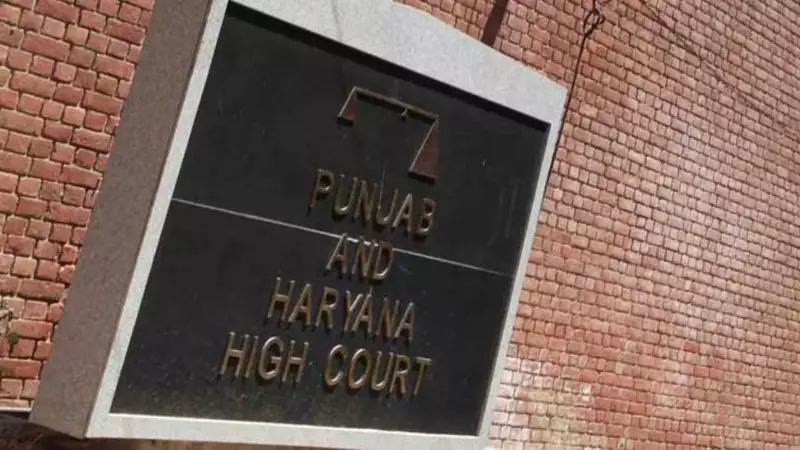
High Court Takes Stern Action Against State Governments
The Punjab and Haryana High Court has taken serious note of the continued non-compliance by state governments regarding the implementation of Aadhaar-based biometric verification for bail sureties. In a significant development, the court has impleaded its own Registrar General as a respondent in a public interest litigation seeking to curb the widespread problem of fake identities and bail bonds in district courts.
Court Issues Notices to Multiple Authorities
Chief Justice Sheel Nagu and Justice Sanjiv Berry, in their order uploaded on Monday, issued formal notices to the states of Punjab, Haryana, the Union Territory of Chandigarh, the Unique Identification Authority of India (UIDAI), and the National Informatics Centre (NIC). This action came after representatives from these entities sought additional time to prepare their responses to the allegations of non-compliance.
The PIL was filed personally on August 14, 2025 by Chandigarh-based Advocate Kanwar Pahul Singh, who highlighted the alarming increase in fake identities and surety bail bonds being used in criminal cases across district courts in Punjab, Haryana, and Chandigarh. The petition argues that despite repeated judicial interventions and specific bail rules, the problem continues to undermine the justice delivery system.
The 2024 Order That Started It All
At the heart of the current petition lies a May 10, 2024 order from a single judge bench in the case of Sharanjit Singh Suraj versus State of Punjab and others. This order had taken strong exception to the misuse of fake sureties and directed comprehensive measures to address the issue.
The key directives from the 2024 order included:
- Punjab, Haryana and Chandigarh to apply for Aadhaar authentication services in all court complexes within 30 days
- The Central government to approve and provide necessary equipment within 60 days
- Complete operationalization of the system, including hardware and software for biometric checks, within four months
- Courts to collect full identity details including Aadhaar cards from sureties
- Mandatory consent for verification and magistrate confirmation of Aadhaar details
The order also provided specific relief for first-time offenders accused of crimes punishable with less than seven years imprisonment. Following Supreme Court guidelines from the Hussainara Khatoon case, courts were directed to avoid insisting on sureties if basic parameters were met after Aadhaar verification.
Complete Non-Compliance Despite Clear Directions
Shockingly, the current petition reveals that these comprehensive directions remain wholly unimplemented more than 17 months later. To substantiate this claim, the petitioner filed Right to Information applications across several districts between July 26 and August 13, 2025.
The responses received painted a grim picture of inaction:
- Courts in Amritsar, SBS Nagar, Gurdaspur and Rupnagar in Punjab confirmed no installation
- Districts of Karnal, Gurugram, Bathinda and Kurukshetra in Haryana reported no progress
- Sangrur in Punjab similarly confirmed absence of Aadhaar authentication services or biometric hardware
The petition characterizes this situation as clear non-compliance with the high court's binding directions, creating a systemic vulnerability in the judicial process.
Real-World Consequences of Inaction
The urgency of the matter is underscored by a June 11, 2025 news report about Khanna police busting a gang that had submitted fake bail bonds in nearly 25 cases. This incident highlights the continuing risks and real-world consequences of the systemic failure to implement the court's directives.
The petitioner, who is a member of the Bar Council of Punjab and Haryana, argues that this failure not only facilitates criminal activities but also erodes public confidence in the judicial process. He notes that officials failed to respond to his representation despite the statutory 60-day response limit.
Seeking Comprehensive Remedies
The PIL seeks multiple remedies to address this critical issue:
- Immediate installation of required biometric verification infrastructure
- Strict enforcement of the 2024 guidelines
- Contempt proceedings against erring officials
- Court-monitored progress reports from the Registrar General
- Periodic audits of surety registers to ensure compliance
The matter has been scheduled for further hearing on December 16, 2025, giving the respondent authorities time to prepare their responses and demonstrate what steps, if any, they have taken to comply with the court's earlier directives.
This case represents a significant test of judicial authority versus administrative inertia, with potentially far-reaching implications for the integrity of the bail system in the region's district courts.





